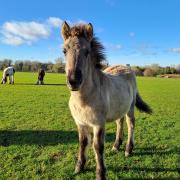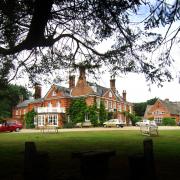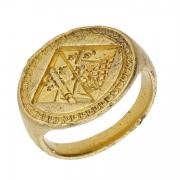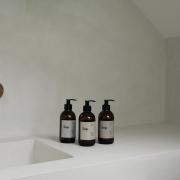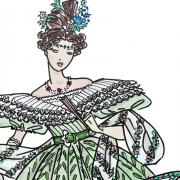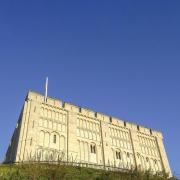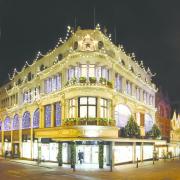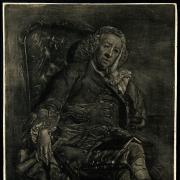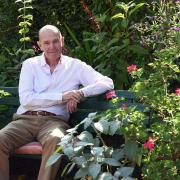Meet Norfolk's mother and daughter sheep farmers who have helped bring two traditional breeds back from the brink.
Australian born Kerry Gibb seems to have always known what she wanted and a lovely photo of three year old Kerry looking extremely serious beside a large pig is testament to this. At a very young age she sensed that her future lay with livestock and later this dream was paired with the desire to live in Norfolk. The daughter of a Jackaroo turned serviceman she travelled the world as a child which included spending some time in Norfolk. Years later when asked where home was, she always said ‘Norfolk’ which was where her heart had remained from those happy early days.
Leading up to her farmhouse in mid Norfolk, the drive is lined with eucalyptus trees, a nod to her antipodean heritage, but this passionate farmer’s life has always been centred around the county she called home.

'I always loved Norfolk best,' she says, despite all the places she has been fortunate enough to visit and live in her busy life. When the desire to farm became too strong to ignore she moved to her family’s farm in Cley and began her farming career with a handful of Jacob sheep and two in-calf Longhorn heifers. She had no experience of farming but read voraciously on the subject, attended courses, learned from visits to livestock markets and set up her own calf rearing business. She was not alone in this vocation and Kerry’s daughter, Suzannah fell in love with the farming life too. From the mid 80s they were rearing, showing, and working with sheep and cattle; mother and daughter, side by side.
In 1987 Kerry bought three Norfolk Horn sheep, they were in category one of the Rare Breeds Survival Trust’s (RBST) endangered list and were very difficult to source because of this. Kerry, with her passion for all things Norfolk, wanted to ensure the survival of this breed that combined the elements that meant so much to her.
'They were very rare, we lived in Norfolk, and they were good looking sheep,' she said.

Kerry and Suzannah spent 25 years building up the breed and helping consolidate its survival, winning many championships along the way. In 2011, with the breed off the critical list and thriving, they felt it was time to move on.
I asked them why they loved farming so much and Kerry says with a smile that she couldn't really imagine not (farming) and for those years, 'It always came back to the Norfolk Horns' despite the many breeds they worked with. Suzannah reinforces this shared passion when she talks about going to shows together.
'We have always shown two (sheep) in each class so that we can both show. At the start it used to be mother and me, but now it is more me and mother.'
Sheep are more than a hobby but just one thread that unites this close family.
This year, like many before, you can find Kerry and Suzannah in the sheep tent at the Royal Norfolk Show and since 2012 their breed of choice has been the Boreray. They fell for this breed after a trip to Scotland and purchased two in lamb ewes soon after. It seems they can’t resist a challenge; this breed was also extremely rare at that time and once again on the RBST’s critical list.

Borerays are a primitive breed of sheep which means they are much smaller and easier to handle than the Norfolk Horns, although faster on their feet so harder to catch.
'The Royal Norfolk Show is very special to us and to everyone in Norfolk,' Kerry tells me, and they love to show their sheep there and encourage other breeders to get involved. They offer support to other participants and have even loaned sheep to help get youngsters started on the farming path. Kerry and Suzannah sell their sheep for breeding and have helped set up several new flocks including sending a starter flock to a new breeder in Kent last year. The breed is renowned for conservation grazing and kept by enthusiasts who want to help this rare sheep flourish. Kerry and Suzannah miss keeping the Norfolk Horns but love seeing this charming native breed slowly increase and become part of the farming landscape in Britain too.
'There is nothing better than sitting in the field, or the barn, with a bowl of nuts and Borerays all around you! They are little characters,' Suzannah says contentedly, sharing the joy that keeping these animals brings to this farming couple. Rather than spending time together shopping or at the spa, Kerry and Suzannah ‘sheep together’.
'The Royal Norfolk Show will always be our favourite; I think your local county show always will be. We also love the Traditional Native Breeds National Show and sale held in Melton Mowbray in September; it has always been a mother/daughter couple of days away.'
It’s full circle for Kerry who as a teenager wrote to the principal of the Western Australian Agricultural College and asked if she could lead a cow around in the Grand Parade at The Perth Royal Show. The reply she received, and has kept all these years, was written as if from the cow herself, expressing excitement at having Kerry show her off on the day. How lovely that so many decades later she is still enjoying the thrill of show day but now here in her chosen county and with her very own Norfolk bred sheep, and her daughter, by her side.




